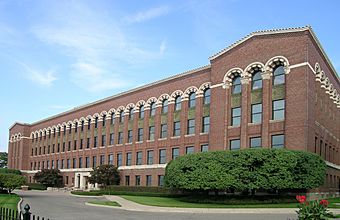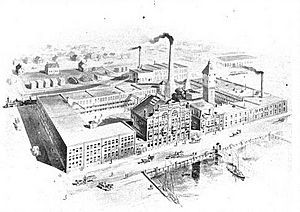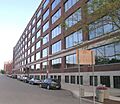River Place facts for kids
Quick facts for kids |
|
|
Parke-Davis and Company Pharmaceutical Plant
|
|

River Place complex on the Detroit International Riverfront
|
|
| Location | Detroit, Michigan |
|---|---|
| Built | 1891 |
| Architect | Donaldson and Meier, Albert Kahn, and Smith, Hinchman and Grylls |
| Architectural style | Romanesque Revival |
| NRHP reference No. | 85002445 |
| Added to NRHP | September 16, 1985 |
Imagine a place where old factories become new homes and offices! That's what happened to the historic River Place in Detroit, Michigan. It's located right by the Detroit International Riverfront. This big area used to be the Parke-Davis and Company Pharmaceutical Plant. It was added to the National Register of Historic Places in 1985 because of its important history.
Contents
A Look Back: How River Place Began
Back in the 1870s, a company called Parke-Davis moved to this spot by the river. They made medicines and other health products. Over many years, from 1891 to 1955, the company grew a lot. They built 26 buildings that are still standing today! This huge area covers more than 14 acres (about 5.7 hectares).
Who Designed These Buildings?
Many famous architects from Detroit helped design these buildings. Some of them include Donaldson and Meier, Albert Kahn, and Smith, Hinchman and Grylls. These buildings are special because they show many different styles of factory architecture from the early 1900s.
From Medicine Plant to Modern Hub
In 1979, Parke-Davis sold their property in Detroit. The Stroh family, known for the Stroh Brewery Company, bought the complex. They changed the name to River Place. Now, these old factory buildings have new lives! They are used as offices, shops, homes, and even a hotel. It's a great example of how old buildings can be reused for new purposes.
What Does River Place Look Like?
The buildings at River Place are made of brick and concrete. They were built at different times, from the early 1900s to after 1920. Some buildings are one story tall, while others are as tall as six stories. In the middle and northern parts of the complex, the buildings are very close together. But closer to the river, there's more open space.
The Famous Research Lab
One of the most important buildings here is the Riverwalk Hotel Detroit. This building used to be the Parke-Davis Research Laboratory. It was built in 1902 right along the Detroit River. This lab was super important! It was the first industrial research lab in the United States built just to study medicines. This new way of doing science helped create many new medicines very quickly. Because of its importance, this research laboratory was named a National Historic Landmark in 1976.
Images for kids
-
Riverwalk Hotel Detroit, formerly the Parke-Davis Research Laboratory
 | Isaac Myers |
 | D. Hamilton Jackson |
 | A. Philip Randolph |






